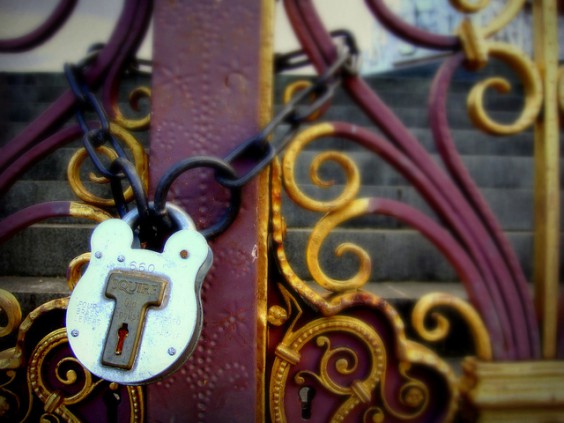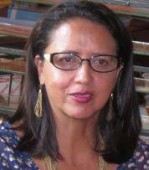Closing Access to Information in Honduras
by Dina Meza and translated by Nelson Eddingfield / March 19, 2015 / No comments
Dina Meza calls for action against state authorities denying journalists – and therefore, Honduran citizens – access to public information.

Locked gates bar Honduran journalists from accessing the National Congress and other government buildings. Photo via Flickr user: Kurtis Garbutt.
The Inter-American Commission on Human Rights’ (IACHR) Declaration of Principles on Freedom of Expression states: “Prior censorship, direct or indirect interference in or pressure exerted upon any expression, opinion or information transmitted through any means of oral, written, artistic, visual or electronic communication must be prohibited by law. Restrictions to the free circulation of ideas and opinions, as well as the arbitrary imposition of information and the imposition of obstacles to the free flow of information violate the right to freedom of expression.”

- Honduras has one of the world’s highest murder rates. It is also one of the most dangerous countries to practice journalism, ranking 129th out of 180 in the 2014 World Press Freedom Index. Journalists are regularly threatened, attacked, and killed for their work. The Honduran government fails to punish those who use violence against reporters, essentially granting them impunity. This space will be dedicated to examining the lack of protection for Honduran journalists exercising their profession. Topics will include the use of state-sponsored advertising as a mechanism to reward or punish publications, and censorship and self-censorship as hindrances to democratic progress.

- Born in Cofradía, Honduras, Dina Meza has been recognized by PEN International, Amnesty International, Index on Censorship and Reporters without Borders for her work as a journalist and human rights advocate. Currently, Dina is the driving force behind the creation of Honduras PEN Centre. In 2013, she wrote “Reign of Terror,” an in-depth report on threats to Honduran journalists for Index on Censorship’s magazine. In 2014, she was named one of Reporters Without Borders’ “100 Heroes and Heroines of Information.”
However, in Honduras “the free circulation of ideas and opinions” is a fantasy. It is the state’s policy to deny information to journalists who do not write in favor of the government in power.
At the close of 2014 I found a gate, held shut with an enormous lock, barring me from the entrance to the National Congress. Three other reporters were also denied access. I asked them why they couldn’t enter, and they answered, “It’s because the current president of the National Congress disfavors us. We placed ourselves here to see if we can pick up on any information.”
These barriers do not only occur in the Parliament, but at other sources of information: the Presidential Palace, the Public Ministry, and other governing bodies where officials believe they have the right to keep information to themselves in spite of the fact that their duty is to bring it into public awareness.
With the arrival of the current president of the republic, Juan Orlando Hernández, many critical sources are now closed to journalists. Outside of the capitol it is much the same story. The mayors of local governments do not tolerate even a single voice that expresses an opinion contradicting what they want to hear.
With the arrival of the current president of the republic, Juan Orlando Hernández, many critical sources are now closed to journalists. Outside of the capitol it is much the same story. The mayors of local governments do not tolerate even a single voice that expresses an opinion contradicting what they want to hear.
Last year, the journalist Gilberto Gálvez had to face a lawsuit initiated by the mayor of La Paz. Gálvez wrote on his Facebook wall that a local bridge had been very costly. The mayor, who had not even been mentioned by the journalist, was so distressed that she brought Gálvez to trial, accusing him of defamation, and used public resources to hire a city attorney to represent her.
Journalists quickly find that there are consequences for criticizing the authorities. The mayor of La Paz tasked herself with following Gálvez. Each time she saw him interviewing someone she told his interviewees not to speak to him.
This is all for the purpose of creating a positive image of the government. In Honduras, everyone must speak in harmony, using the discourse that is handed down by those in positions of power and homogenizing information in such a way that when one voice moves in opposition, it swiftly faces consequences.
César Silva, a journalist and vocal critic of the government on his television program Vanguardia, receives threats on a daily basis in different forms, including police fines for parking his car. Although he is parks legally, he is fined up to 100 times more than what an average citizen pays.
Silva is forbidden from entering the National Congress and the executive offices and has no alternate access to these sources. When he asks on what grounds he is barred from entering, he is met with silence. The censorship also extends throughout the media industry. The stigma is such that even other journalists take care not to let themselves be seen talking to those who are stigmatized.
Pen International, in its October 2014 report to the Council on Human Rights of the United Nations, indicated, “In the last four years there has been a reduction in public transparency and a regression towards a culture of secrecy where access to official sources becomes continually more restricted….” The UN’s Universal Periodic Review (UPN) of Honduras, which will meet again next May, contributed to the report.
What is worrisome is that this situation is so normalized in Honduras that the country’s journalists take it for granted and resign themselves to supporting four years of a government that shuts the doors on them and denies them access to information.
The problem is not only that the journalists are denied access to sources but also that it comes at the expense of Honduran society. People are not aware of information that is vital for decision-making.
I think that as long as officials who deny access to information do not feel any resistance from the Honduran people and the press, the situation will continue. Society, as well as the journalists who inform it, need to take action.




